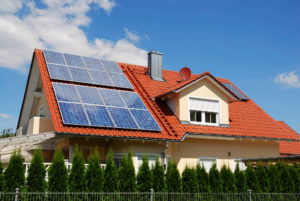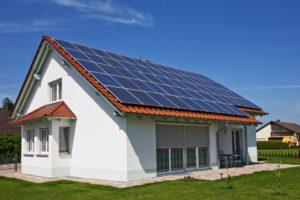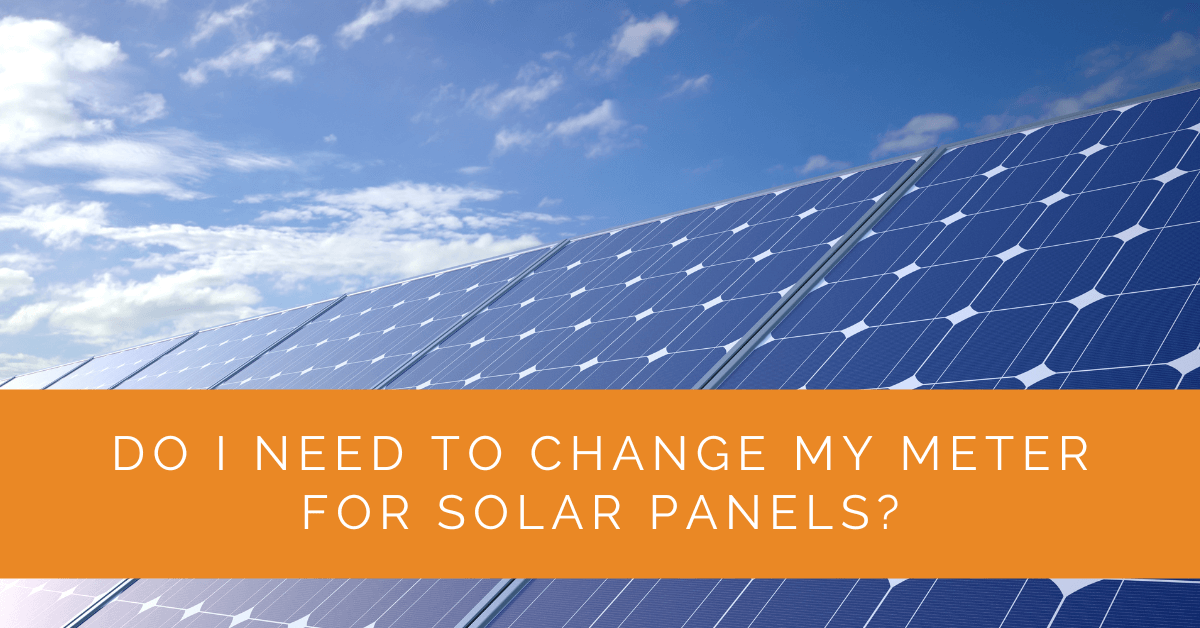Solar panels have revolutionized how homeowners harness sun energy to power their homes. However, one common question when considering solar panel installation is whether you need to change your existing meter. In this comprehensive guide, we will explore the intricacies of meters in the context of solar energy systems and help you determine whether a meter change is necessary for your solar journey.
Contents
- 1 Key Takeaways
- 2 The Basics of Meters
- 3 Net Metering and Its Significance
- 4 Do You Need to Change Your Meter?
- 5 Solar Meter Compatibility Checker
- 6 Understanding Solar Costs and Metering
- 7 The Process of Meter Replacement
- 8 Case Study: Upgrading to a Smart Meter for Solar Panel Efficiency
- 9 Expert Insights From Our Solar Panel Installers About Changing Meters for Solar Panels
- 10 Experience Solar Excellence with Us!
- 11 Conclusion
Key Takeaways
- Determine if your existing meter is compatible with your solar panel installation, as older meters may not efficiently measure solar production.
- Upgrading to a bi-directional or smart meter can accurately track energy production and consumption, optimizing savings and billing accuracy.
- Engage experienced installers and work closely with your utility company when changing your meter to ensure a seamless transition to solar power.
The Basics of Meters
Understanding the Role of Meters in Solar Panel Installations
Meters play a pivotal role in monitoring and measuring the amount of electricity your solar panels produce and consume. They serve as the bridge between your solar system and the utility grid, allowing you to track your solar power generation and electricity consumption accurately.
Types of Meters Used in Residential Settings
Traditional Electricity Meters
Traditional meters are the ones you likely have installed in your home. These meters measure the total amount of electricity you use, including what you consume from the grid and what you export to the grid when your solar panels produce excess electricity.
Smart Meters
Smart meters, on the other hand, are designed to facilitate two-way communication between your home and the utility company. They can monitor not only your electricity consumption but also the electricity your solar panels produce. This makes them a valuable asset for homeowners installing solar PV systems.
How Your Existing Meter Functions with Your Current Electricity Bill
Your electricity bill is calculated based on the readings from your meter. If you have a traditional meter, it measures the total electricity you use, including what you consume from the grid and what you export to the grid when your solar panels produce excess electricity. Understanding how your meter interacts with your billing is crucial to grasp the financial implications of solar energy adoption.
The Transition from Conventional to Solar Energy
When you transition to solar energy, your metering needs may change. It’s essential to assess your current meter’s compatibility with solar panels to ensure efficient monitoring and billing. The transition isn’t just about generating solar power; it’s about seamlessly integrating it into your existing energy system.

Net Metering and Its Significance
What Is Net Metering and How Does It Work?
Net metering is a critical aspect of solar energy systems. It allows homeowners to send excess electricity generated by their solar panels back to the grid, effectively spinning their electricity meter backward. This surplus energy can be used as a credit to offset future electricity bills, providing an economic incentive for solar panel adoption.
Benefits of Net Metering for Solar Customers
Net metering offers several advantages for solar customers. It provides a convenient way to store excess solar production for later use and can significantly reduce your monthly electricity bills. Additionally, it promotes sustainability by allowing homeowners to contribute clean energy back to the grid, further reducing reliance on fossil fuels.
Types of Net Metering Arrangements
Different types of net metering arrangements depend on your location and utility company. Understanding these options is crucial when deciding whether to change your meter. Some regions offer one-to-one net metering, while others have time-of-use arrangements. Each has its advantages and considerations that can affect your solar power economics.
Do You Need to Change Your Meter?
Assessing Your Current Electricity Meter
To determine if you need to change your meter, start by assessing your current meter. Check if it’s a smart or traditional smart meter, as this will greatly influence its compatibility with your solar panel system. If you have an older, traditional meter, it may not efficiently measure the energy you generate from your solar panels, potentially affecting your savings.
The Role of a Bi-Directional Meter
In most cases, homeowners transitioning to solar will require a bi-directional meter. These meters can measure electricity flow in both directions—into your home from the grid and back to the grid from your solar panels. They play a critical role in accurately tracking the energy you produce and consume, ensuring that you receive proper credit for your solar electricity contributions.
Compatibility of Meters with Solar Installations
Ensuring your chosen meter is compatible with your solar panel installation is essential. Some older meters may need to be replaced to support the bidirectional flow of electricity. Compatibility issues can lead to inaccurate meter readings, affecting your billing and potentially causing frustration.
Reasons to Consider Changing Your Meter
Changing your meter is advisable for various reasons, such as accurate solar production monitoring, maximizing savings, and complying with utility requirements. A meter designed specifically for solar systems can provide precise data on your solar electricity production, allowing you to track your system’s performance and assess its efficiency.
Solar Meter Compatibility Checker
Not sure if you need a new meter for solar panels? Answer a few quick questions:

Understanding Solar Costs and Metering
How Meters Impact Solar Costs
The type of meter you have can impact the overall cost of your solar panel installation. Smart meters may come with an additional cost, but they can provide long-term savings through accurate billing. Considering the long-term benefits and potential savings is crucial when evaluating the cost-effectiveness of meter replacement.
Potential Savings with the Right Meter
The right meter can help you make the most of your solar investment. You can optimize your energy system for maximum savings by accurately tracking your solar production and consumption. Understanding the financial implications of your meter choice is essential for budget-conscious homeowners looking to harness the full potential of solar energy.
Cost Considerations When Upgrading Meters
When considering meter replacement, it’s essential to factor in the costs associated with the installation. Consult with your solar installer to clearly understand the expenses involved. While there may be an initial cost, weighing it against the potential long-term savings and benefits of accurate metering is essential.
The Process of Meter Replacement
Steps Involved in Changing Your Meter
Replacing your meter involves a series of steps: assessment, procurement, and installation. Understanding this process can help you plan for a smooth transition. It’s advisable to work closely with your solar installer, who can guide you through the necessary steps and ensure that the replacement aligns with your solar panel installation schedule.
Working with Your Utility Company
Coordinating with your utility company is crucial when changing your meter. They must approve the new meter and ensure it meets their requirements. Collaboration with the utility company ensures that your solar system seamlessly integrates into the grid and that you comply with any regulations or guidelines they have in place.
Finding Professional Installers for Meter Replacement
Engaging experienced professionals for meter replacement is essential to ensure the work is done correctly and complies with local regulations. Experienced installers can assess your specific needs, recommend the appropriate meter, and handle the installation process efficiently, minimizing any disruptions to your solar energy system.
Case Study: Upgrading to a Smart Meter for Solar Panel Efficiency
Background
At Solar Panels Network USA, we prioritize optimizing solar energy systems for maximum efficiency and savings. This case study highlights a homeowner’s journey of upgrading to a smart meter to enhance their solar panel system’s performance.
Project Overview
The homeowner had recently installed a solar panel system and was experiencing difficulties accurately tracking their solar energy production and consumption with their traditional electricity meter. They contacted us to assess whether upgrading to a smart meter would resolve these issues and optimize their solar investment.
Assessing the Existing Meter
- Initial Evaluation: We began by assessing the homeowner’s existing traditional meter. Traditional meters are designed to measure overall electricity consumption but often fall short in accurately handling the bidirectional flow of electricity involved in solar energy systems.
- Identifying the Need for a Smart Meter: Our evaluation revealed that the traditional meter was not equipped to accurately measure the energy produced by the solar panels and the excess electricity exported to the grid. This limitation was causing discrepancies in billing and preventing the homeowner from fully benefiting from their solar investment.
The Role of the Smart Meter
- Accurate Measurement and Monitoring: We recommended upgrading to a smart meter, specifically designed to handle the complexities of solar energy systems. A smart meter facilitates two-way communication with the utility company, accurately measuring the electricity consumed from the grid and the surplus energy sent back to the grid.
- Real-Time Data Insights: Smart meters provide real-time data on energy production and consumption, allowing homeowners to monitor their solar system’s performance closely. This transparency empowers homeowners to make informed decisions about their energy usage and optimize their savings.
Implementation
- Coordination with the Utility Company: We coordinated with the homeowner’s utility company to ensure the new smart meter met all regulatory requirements and standards. The utility company’s approval was crucial for the seamless integration of the smart meter with the existing solar system.
- Professional Installation: Our experienced installation team handled the smart meter installation. The process involved replacing the traditional meter with the new smart meter and configuring it to accurately track the bidirectional flow of electricity. The installation was completed efficiently, minimizing any disruptions to the homeowner’s energy system.
Results
- Improved Billing Accuracy: With the smart meter in place, the homeowner experienced immediate improvements in billing accuracy. The meter precisely measured the electricity consumed from the grid and the excess energy exported, ensuring the homeowner received the appropriate credits for their solar contributions.
- Enhanced Energy Management: The real-time data provided by the smart meter allowed the homeowner to monitor their solar energy production and consumption more effectively. They could identify peak production times and adjust their energy usage to maximize savings.
- Maximizing Solar Savings: By upgrading to a smart meter, the homeowner optimized their solar investment. The accurate tracking and monitoring facilitated by the smart meter enabled them to take full advantage of net metering benefits, significantly reducing their monthly electricity bills.
Summary
This case study demonstrates the importance of upgrading to a smart meter for homeowners with solar panel systems. Accurate measurement, real-time data insights, and seamless integration with the grid are crucial for optimizing solar energy production and consumption. At Solar Panels Network USA, we are committed to providing tailored solutions that enhance our clients’ solar experiences and maximize their savings.
Upgrading to a smart meter is a valuable investment for any solar energy system. It ensures accurate billing, empowers homeowners with real-time data, and maximizes the benefits of solar energy. If you are considering a solar panel installation or looking to optimize your existing system, consult with our experts to explore the best metering solutions for your needs.
Expert Insights From Our Solar Panel Installers About Changing Meters for Solar Panels
Upgrading to a bi-directional or smart meter is crucial for accurately tracking the energy your solar panels produce and consume. It ensures you get the most out of your investment and optimize your savings.
Lead Solar Installer
Traditional meters may not efficiently handle the complexities of solar energy systems. A modern smart meter can provide real-time data, making it easier to monitor performance and manage your energy usage effectively.
Senior Solar Consultant
Working closely with your utility company and a professional installer is essential when changing your meter. They help ensure a seamless integration with the grid and compliance with all necessary regulations.
Solar Installation Expert
Experience Solar Excellence with Us!
Trust in Solar Panels Network USA, where our seasoned experts deliver top-quality solar solutions for homes and businesses nationwide. With a legacy of countless successful installations and a commitment to sustainable energy, we’re your reliable partner in the solar journey. Ready for a brighter, eco-friendly future? Call us now at (855) 427-0058 and harness the power of the sun!
Conclusion
Whether you need to change your meter for solar panels largely depends on your current meter’s type and compatibility with solar energy systems. While traditional meters can work, upgrading to a smart or bi-directional meter often benefits solar homeowners. The choice ultimately impacts your solar power savings, accurate monitoring, and the seamless integration of your solar PV system with the grid.
Making an informed decision about metering is vital as you embark on your journey towards renewable energy. By understanding the role of meters, the benefits of net metering, and the options available, you can optimize your solar panel installation for maximum efficiency and cost savings. Whether you’re a new homeowner looking to go solar or an existing solar customer, metering is a critical aspect of your renewable energy system. It’s an investment that can enhance your solar experience and contribute to a more sustainable future.
About the Author
Solar Panels Network USA stands at the forefront of solar energy solutions, driven by a team of seasoned solar engineers and energy consultants. With over decades of experience in delivering high-quality solar installations and maintenance, we are committed to promoting sustainable energy through customer-centric, tailored solutions. Our articles reflect this commitment, crafted collaboratively by experts to provide accurate, up-to-date insights into solar technology, ensuring our readers are well-informed and empowered in their solar energy decisions.

